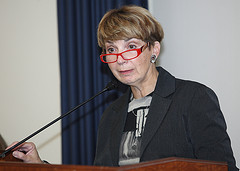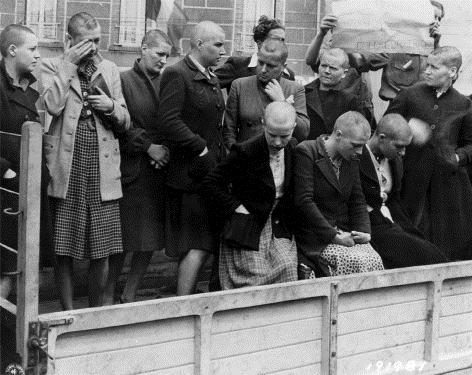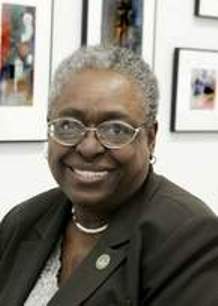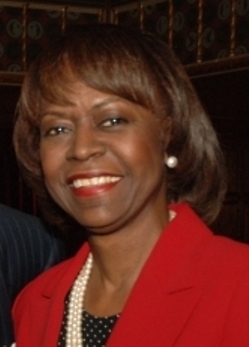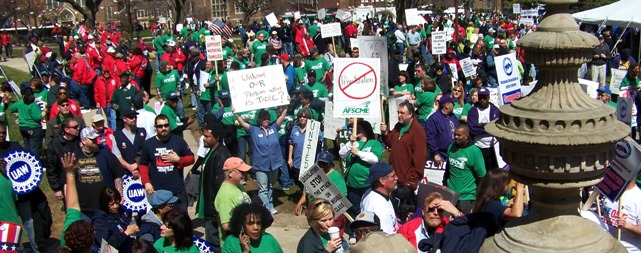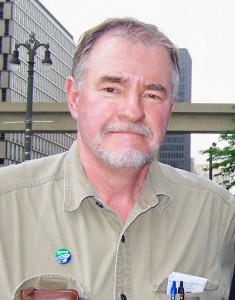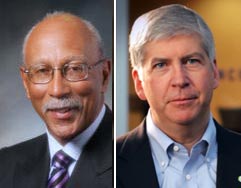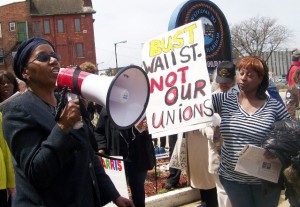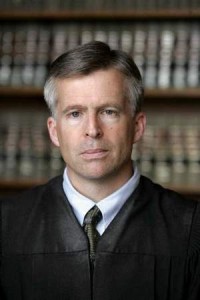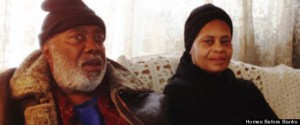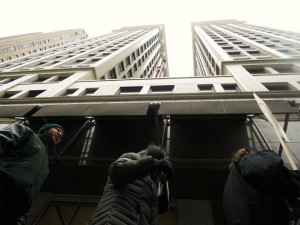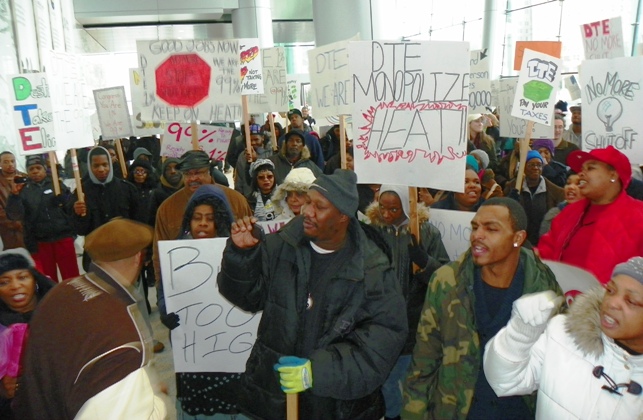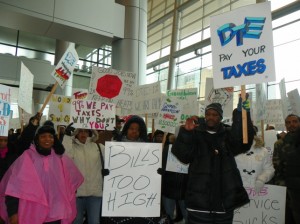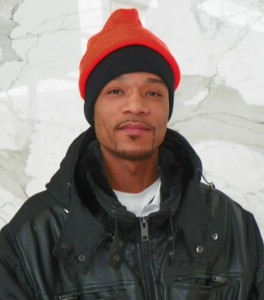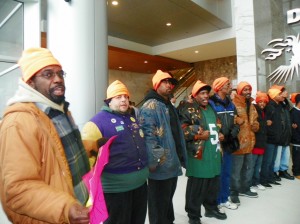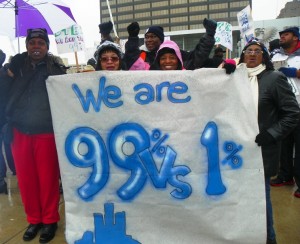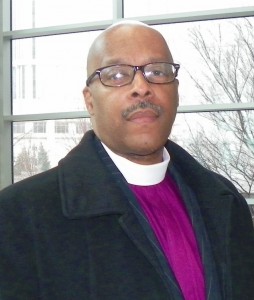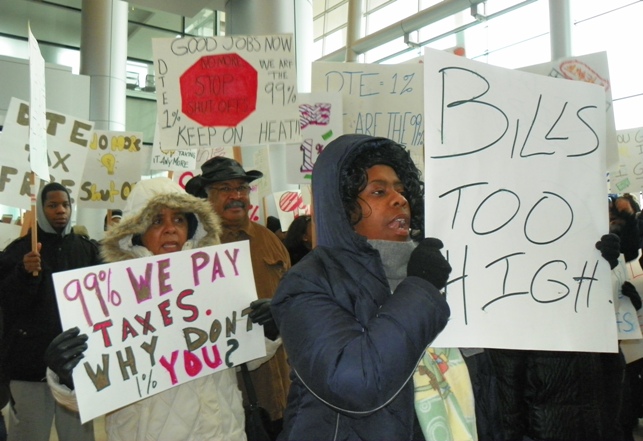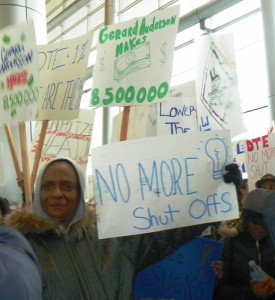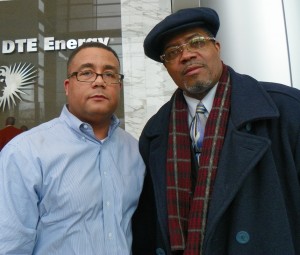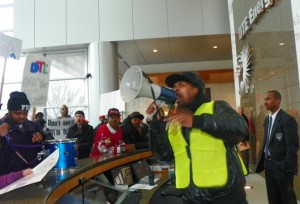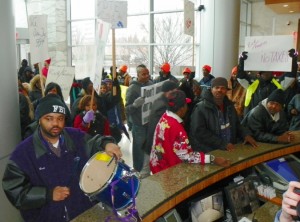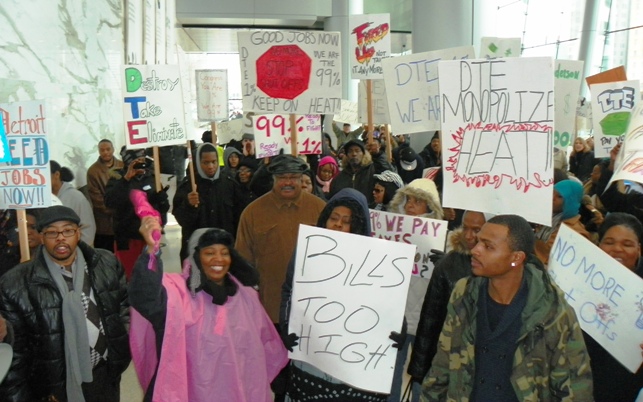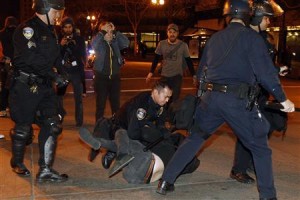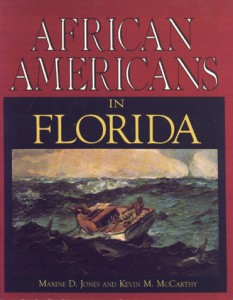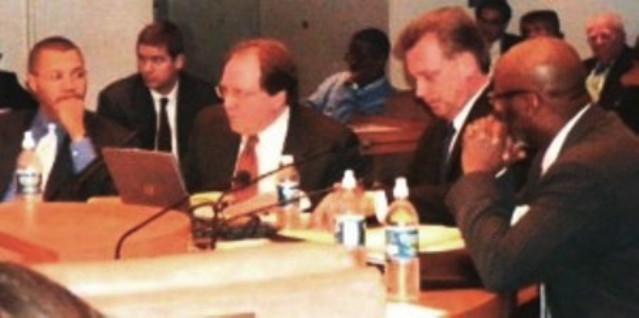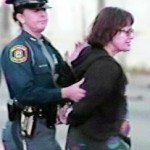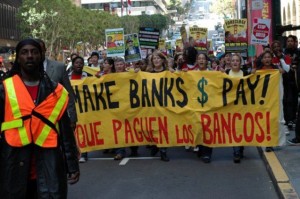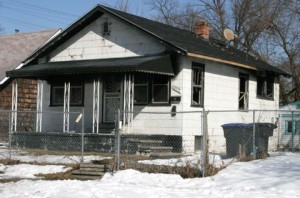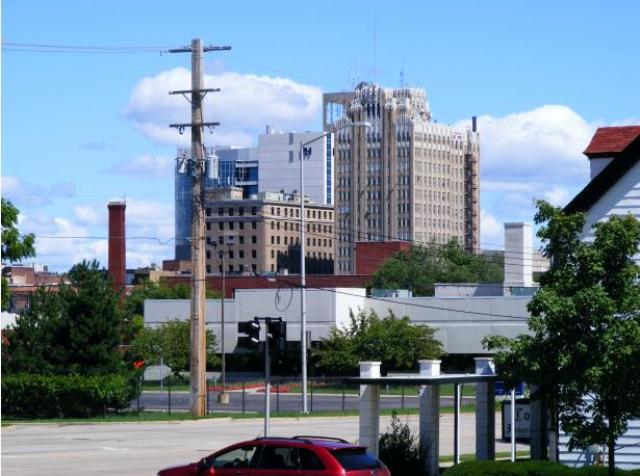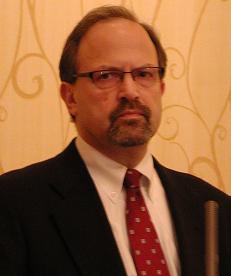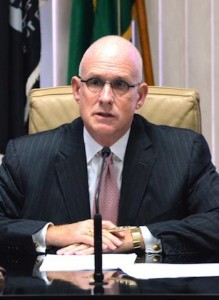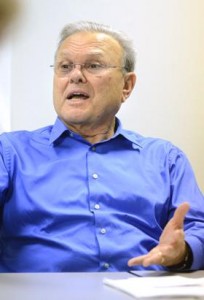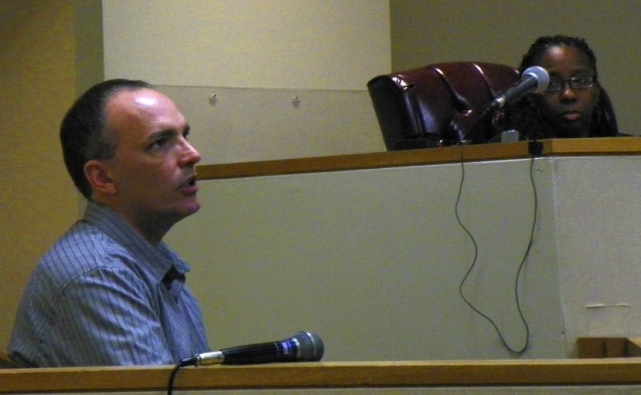
- “Jail-house snitch” Jay Schlenkerman testifies against Charles Jones as 36th District Court Judge E. Lynise Bryant-Weekes listens
VOD EDITOR: THIS STORY AS UPDATED FEB. 18, 2012 CONTAINS A RETRACTION/CORRECTION REGARDING MR. PETER VALENTE’S BUSINESS STATUS, AND OTHER CHANGES REQUESTED BY THE ATTORNEY FOR CRW, INC. THERE IS ADDITIONALLY UPDATED INFORMATION ON UPCOMING COURT DATES FOR CHARLES JONES.
By Diane Bukowski
January 28, 2012

Aiyana Stanley-Jones with little brother prior to her killing by police (Family photo)
DETROIT – Thirty-Sixth District Court Judge E. Lynise Bryant-Weekes bound Charles Jones, father of Aiyana Stanley-Jones, over to Wayne County Third Circuit Court on first-degree murder, felony firearms and perjury charges Jan. 26, based largely on the testimony of Jay Allen Schlenkerman.
Jones’ attorney characterized Schlenkerman as a “jail-house snitch” during a previous court hearing.
Schlenkerman claimed Chauncey Owens, also charged with first-degree murder, told him that Jones gave him the gun used to kill Je’rean Blake May 14, 2010, two days before Detroit police conducted a brutal raid on Jones’ home May 16, 2010. Detroit officer Joseph Weekley shot 7-year-old Aiyana to death during the raid.
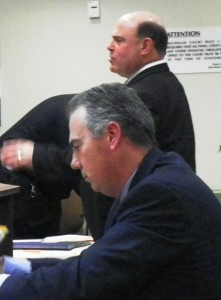
Jones' attorney Leon Weiss argues against admission of Schlenkerman's testimony; asst. prosecutor Robert Moran in front
“I love my brother,” Aiyana’s aunt LaKrystal Sanders called out twice after Bryant-Weekes’ ruling, only to be admonished by the judge. Aiyana’s grandmother Mertilla Jones wept. Court officers and Detroit police then chased at least ten members of Jones’ family out of the court and onto the elevators before they could talk to his attorney, Leon Weiss of the law firm of Fieger, Fieger, Kenney, Giroux & Danzig.
Bryant-Weekes first noted the testimony of two eyewitnesses, Sylvester Bell and Amber Holloway. Neither said they knew or saw that Jones gave Owens the gun.
Bell only identified Owens as the shooter. Holloway testified that she was a passenger in the car with Blake and others, and that Jones was in the SUV from which Owens, Jones and others exited prior to the shooting. She said she did not see the shooting, but that she saw Blake “hike up his pants as if he was about to fight.”
Bryant-Weekes then described Schlenkerman’s testimony.
 “Jay Schlenkerman testified that he had a conversation with Chauncey Owens who said he had shot the young man, then had a conversation with Charles Jones at his house,” she said. “Then the two individuals returned to the store [where Blake was shot]. The witness testified that Mr. Owens testified that Charles Jones gave him the gun.”
“Jay Schlenkerman testified that he had a conversation with Chauncey Owens who said he had shot the young man, then had a conversation with Charles Jones at his house,” she said. “Then the two individuals returned to the store [where Blake was shot]. The witness testified that Mr. Owens testified that Charles Jones gave him the gun.”
Schlenkerman also said under oath during the hearing that he himself has been convicted of only one felony, a third offense of drunk driving, when in fact court records show he has been convicted of seven felonies. (See box at left.)
Weiss had moved unsuccessfully to exclude Schlenkerman’s testimony, saying it did not fall within the parameters of Michigan Rule of Evidence 804(b), which allows “hearsay” testimony under some circumstances.
Prominent, long-time criminal defense and appeals attorney John Royal told VOD Schlenkerman’s testimony as it related to Jones should not have been admitted.
“That was an improper interpretation of the court rule,” Royal said. “To the extent that Owens’ statement said he himself did something wrong, it was admissible. But to the extent he says someone else did something wrong, it is not admissible.”
Royal also said the admission violated a 2004 U.S. Supreme Court ruling in the case of Crawford v. Washington, which made hearsay statements inadmissible if the defendant is not able to cross-examine the maker of the statement. In this case, Owens earlier refused several times to testify at Jones’ preliminary exam.
Royal said Bryant-Weekes’ admission of Schlenkerman’s statement is not binding on the Wayne County Circuit Court judge who hears the case. Jones’ arraignment on the information was held Feb. 2 according to court records. His case is scheduled to be heard, along with that of Owens, in front of Wayne County Circuit Court Judge Richard Skutt. A motion hearing is set for April 20 at 9 a.m. A final conference is scheduled for April 27, and a jury trial date was set for June 20, 2012.

- Debbie C. sustained these injuries to her eyes and mouth, among others, from Schlenkerman beating her across the face with his belt; photo from court files
Schlenkerman was incarcerated in the Wayne County Dickerson facility, where Owens was also being held, from July 1 to Nov. 16, 2011, for “aggravated domestic violence.” Sanders said Owens told her that Schlenkerman told other prisoners that he himself was in jail for a “bar fight.”
According to a previous statement from Owens’ attorney David Cripps, and court records, both were held in segregation at various times. It is unclear at which points Schlenkerman came into contact with Owens.
Schlenkerman claimed Owens made unusually detailed statements to him about his case in October and November. In response to a question from Weiss, he said he had told a “little bit” about those statements to Peter Valente. Court records from the 33rd District show that Schlenkerman currently resides at 219 Windward Court in Detroit’s Harbortown complex, which is also Valente’s address, according to Wayne County Register of Deeds records and publicy available listings.
Valente is the CEO of Sales for CRW, Inc., a ceramic tile wholesaler in Detroit, according to a Detroit business website. Schlenkerman does tile installation work, but according to CRW, Inc.’s attorney J. Peter Hauser, is not employed by or a contractor for CRW, Inc.

Wayne County Circuit Court Judge Richard Skutt (Facebook photo)
Despite the detailed nature of his testimony, Schlenkerman said he had never written down any notes after talking with Owens. He said the only written record he made was the statement he gave to Assistant Prosecutor James Bivins Nov. 26.
“He [Owens] told me he was there for the murder of Je’Rean Blake,” Schlenkerman testified impassively. “He told me he and his younger brother Chinaman rode their white scooters up to the party store. Chauncey Owens asked Je’Rean Blake if he had anything for him. The kid blew him off and shrugged, then Owens told him, ‘I’ve got something for you.’”
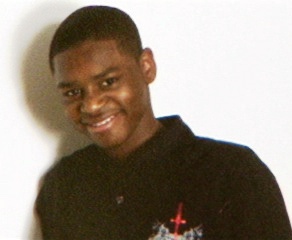
Je'Rean Blake
Throughout his testimony, Schlenkerman, a white man who has spent most of his life in majority-white communities including various downriver suburbs as well as Adrian, referred to Charles Jones as “C.J.,” and his brother Sherrod Heard as “Chinaman,” as if he knew them. He variously identified the SUV involved as a white or silver Suburban.
“They rode their scooters back to the house, and had a conversation with his brother-in-law C.J.,” Schlenkerman said. “C.J. told Chinaman to ditch the scooters, and they drove in a silver Suburban back to the party store. He didn’t say what they talked about. C.J. gave Chauncey Owens a gun. Chauncey Owens got out of the Suburban. Je’Rean Blake seen him and started running across the parking lot. Then he got back into the Suburban and they drove him back to the abandoned house where Chinaman ditched the white scooters. They picked Chinaman up and drove back to their house. C.J. told Chinaman, ‘We took care of business, this is the way you do it.’”
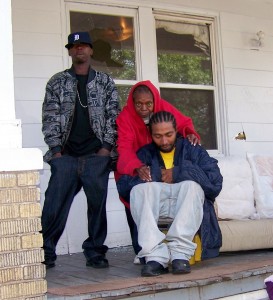
Aiyana Jones' father Charles Jones is comforted by her great aunt Joann Robinson as he sits on couch where she died the morning of her killing, and below window shattered by grenade; Ms. Robinson has passed away since Aiyana was killed.
During her ruling, Bryant-Weekes said Schlenkerman’s testimony was that Jones said “we took care of someone.”
Schlenkerman said he went to the prosecutor’s office several days after he was released, “because I felt bad for the kid. I have kids myself. It could have been my daughter.”
According to various court records, Schlenkerman owes many thousands of dollars in child support for several different children.
He said he had not been offered a deal, and that his testimony was “110 percent the truth.”
Court records show that in October, the prosecutor’s office dropped five of eight counts of violating a personal protection order against Schlenkerman. The order was issued by Wayne County Circuit Court Judge Richard Halloran and involved numerous attempts to contact Debbie C., the victim of the domestic violence, while he was in jail.

Asst. Prosecutor Opolla Brown
Wayne County Assistant Prosecutor Opolla Brown earlier reduced the original felony charge of “kidnapping” cited by Brownstown Township police, to a misdemeanor, “aggravated domestic violence.” (to read details of victim’s account of the brutal beating, rape, and bestial acts that Schlenkerman performed on her May 25-28, 2011, click on http://voiceofdetroit.net/2012/01/10/schlenkerman-brutally-abused-women-lied-served-mdoc-time-for-repeat-dui%e2%80%99s-but-is-%e2%80%98jail-house-snitch%e2%80%99-in-jones-case/.)
On cross-examination, Schlenkerman claimed he did not know anything about the police killing of Jones’ daughter Aiyana, although he testified that he watched Fox 2 News with Chauncey Owens repeatedly and wondered why Owens kept watching that channel. Most news reports on Owens’ case have given details of Aiyana’s death.
Schlenkerman told Weiss that Owens never told him he had already pled guilty to second-degree murder in Blake’s death.
“You’re telling the court he told you each and every detail except that he pled guilty?” Weiss asked him rhetorically.
Despite the fact that Wayne County Pre-trial Services recommended that Jones be given a $100,000 bond, 10 percent cash, Bryant-Weekes remanded him back to jail without bond.
 LANSING – As tax season starts in full swing, a new report says low income families will be hardest hit by a state tax reform package passed last year.
LANSING – As tax season starts in full swing, a new report says low income families will be hardest hit by a state tax reform package passed last year.


